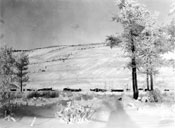 |
back to main story | |
| Ross River - Community Profile | ||

July 1923, Panorama of the Pelly River Valley with the Pelly Mountains visible in the background.
Yukon Archives: #7112

Isn't this 'some' place to live and call home?” Ross River community, ca. 1930.
Yukon Archives: #7285
Ross River Area First Nations Profile
The Kaska people of the Ross River area had managed to maintain their
isolation from the non-Native incursion longer than many other First
Nations groups in the Yukon and Alaska. The Gwitchin of Rampart House
and Fort Yukon and the Han of the Dawson City area had long been exposed
to missionaries, churches and the Christmas celebrations Mary was so
fond of. But for many of those who lived near Ross River, Christian rituals
and the god they celebrated were new. Mary Moses was one of the daughters
of Bella Martin and Reverend John Martin, an Anglican missionary who
served in Ross River during the early 1930s. She would later recall "It
was strange. Those people up at Ross River hadn't heard about the Lord.
So we had to teach them, and I taught them." (quoted
in: Catherine McClellan, Part of the Land, Part of the Water, 289.)
| ||
 |
back to main story | |